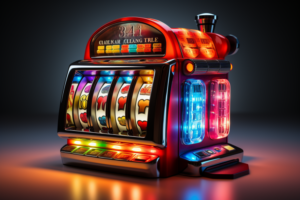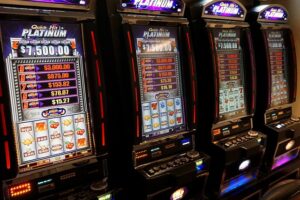 Selamat datang di dunia togel online! Apakah anda penggemar judi online yang sedang mencari informasi tentang situs togel terpopuler di Indonesia? Jika iya, artikel ini akan membantu anda menemukan jawabannya. Mulai dari jenis situs togel online hingga tips memilih yang terbaik, simaklah informasi lengkapnya di sini. Ayo mulai petualangan seru dalam dunia togel online bersama kami!
Selamat datang di dunia togel online! Apakah anda penggemar judi online yang sedang mencari informasi tentang situs togel terpopuler di Indonesia? Jika iya, artikel ini akan membantu anda menemukan jawabannya. Mulai dari jenis situs togel online hingga tips memilih yang terbaik, simaklah informasi lengkapnya di sini. Ayo mulai petualangan seru dalam dunia togel online bersama kami!
Apa itu Togel Online?
Togel online merupakan permainan judi yang populer di Indonesia. Singkatnya, togel adalah singkatan dari “toto gelap”, di mana pemain menebak angka untuk memenangkan hadiah. Dulu, togel hanya bisa dimainkan melalui bandar darat, namun seiring perkembangan teknologi, kini dapat dinikmati secara online.
Perbedaan utama antara togel konvensional dan togel online terletak pada cara bermainnya. Dengan platform online, pemain dapat mengakses situs togel dengan mudah melalui komputer atau ponsel pintar mereka. Selain itu, taruhan juga bisa dilakukan kapan saja dan di mana saja sesuai keinginan.
Meskipun terdapat perbedaan dalam metode bermainnya, prinsip dasar permainan tetap sama. Pemain harus menebak kombinasi angka yang akan keluar pada hasil undian tertentu. Keberuntungan dan strategi merupakan faktor kunci dalam meraih kemenangan besar di dunia togel online ini!
Jenis Situs Togel Online
Apa itu togel online? togel online adalah permainan judi yang melibatkan pemilihan angka-angka untuk dipertaruhkan. Jenis situs togel online bermacam-macam, mulai dari yang menyediakan pasaran lokal hingga internasional. Beberapa situs togel online populer di Indonesia antara lain JPTOTO, yang menawarkan berbagai jenis permainan dan pasaran terbaik kepada para pemainnya. Dengan adanya pilihan pasaran yang beragam, pemain dapat memilih sesuai dengan preferensi mereka.
Kelebihan dari togel online adalah kemudahan akses tanpa harus keluar rumah, serta fleksibilitas dalam memasang taruhan kapan pun dan di mana pun. Selain itu, banyak situs togel online juga memberikan bonus dan promo menarik bagi para membernya. Jenis permainan yang tersedia di situs togel online juga sangat variatif, mulai dari 4D, 3D, 2D, colok bebas, colok jitu hingga shio. Para pemain bisa memilih variasi permainan sesuai dengan keahlian dan strategi mereka. Memilih situs togel online terbaik penting dilakukan agar pengalaman bermain lebih menyenangkan dan aman. Pastikan situs tersebut memiliki lisensi resmi dan reputasi baik di kalangan pemain judi online.
Kelebihan Dari Togel Online
Togel online memiliki beberapa kelebihan yang membuatnya semakin populer di kalangan pemain judi online. Salah satunya adalah kemudahan aksesibilitas, dimana pemain dapat dengan mudah bermain kapan saja dan di mana saja tanpa harus pergi ke tempat perjudian fisik. Hal ini tentu memberikan fleksibilitas kepada para pemain untuk menikmati permainan favorit mereka tanpa batasan waktu dan lokasi.
Selain itu, togel online juga menawarkan beragam pilihan jenis permainan yang bisa dipilih sesuai dengan preferensi masing-masing pemain. Dari togel 2D hingga colok jitu, ada banyak opsi menarik yang dapat dinikmati oleh para penggemar judi online. Kemudahan dalam pembayaran kemenangan juga menjadi salah satu keunggulan dari togel online, dimana proses pencairan dana biasanya cepat dan efisien.
Keamanan dan privasi data pemain juga menjadi fokus utama bagi situs togel online terpercaya. Dengan sistem enkripsi yang canggih, para pemain dapat merasa aman saat melakukan transaksi atau berinteraksi dengan situs tersebut. Seluruh informasi pribadi akan tetap terjaga kerahasiaannya sehingga para pemain bisa fokus pada permainan tanpa khawatir tentang data pribadi mereka bocor atau disalahgunakan secara tidak sah.
Jenis Permainan yang Tersedia di Situs Togel Online
Situs togel online menawarkan berbagai jenis permainan yang menarik bagi para pemain judi online. Salah satu jenis permainan yang populer adalah 4D/3D/2D, di mana pemain harus menebak angka keluar sesuai dengan taruhan yang dipasang. Permainan ini memberikan kesempatan untuk memenangkan hadiah besar dengan menebak angka secara tepat. Selain itu, terdapat juga Colok Bebas dan Colok Naga yang mengharuskan pemain menebak angka tanpa urutan tertentu. Para pemain dapat memilih variasi taruhan sesuai dengan strategi mereka untuk meningkatkan peluang kemenangan.
Permainan Tengah-Tepi merupakan opsi lain di situs togel online, di mana pemain dapat memasang taruhan pada posisi tengah atau tepi dari hasil pengundian angka. Dengan banyaknya pilihan permainan yang tersedia, para pemain memiliki fleksibilitas untuk mencoba strategi berbeda-beda dalam memenangkan hadiah besar. Tak hanya itu, masih ada juga permainan Dasar serta Kombinasi yang menambah keseruan dan tantangan bagi para pecinta togel online. Dengan ragam pilihan game tersebut, setiap pemain bisa menemukan variasi permainan sesuai selera dan keberuntungan mereka sendiri!
Tips Memilih Situs Togel Online Terbaik
Saat memilih situs togel online terbaik, ada beberapa hal penting yang perlu diperhatikan agar pengalaman bermain anda menjadi lebih menyenangkan dan aman. Pertama-tama, pastikan situs tersebut memiliki lisensi resmi dari lembaga judi yang diakui untuk menjamin keamanan transaksi dan perlindungan data pribadi anda. Selain itu, cek reputasi situs togel online tersebut dengan membaca ulasan dari pemain lain atau bergabung dalam forum diskusi tentang judi online. Pengalaman orang lain dapat memberikan gambaran mengenai kualitas layanan dan kejujuran situs tersebut.
Perhatikan juga jenis permainan yang ditawarkan oleh situs togel online. Pastikan bahwa situs tersebut menyediakan variasi game sesuai dengan preferensi anda, sehingga anda tidak bosan saat bermain. Jangan lupa untuk memeriksa metode pembayaran yang disediakan oleh situs togel online terbaik. Pastikan bahwa metode pembayaran yang mereka tawarkan aman dan nyaman bagi anda untuk melakukan deposit dan penarikan dana. Dengan memperhatikan tips-tips di atas, anda dapat lebih mudah menemukan situs togel online terbaik yang sesuai dengan kebutuhan serta preferensi bermain anda. Jangan ragu untuk melakukan riset lebih lanjut sebelum membuat keputusan akhir dalam memilih platform judi online!
Penutup
Dengan begitu banyak pilihan situs togel online di luar sana, sangat penting untuk melakukan riset dan memilih dengan bijaksana. Pastikan untuk memperhatikan reputasi situs, layanan pelanggan, variasi permainan yang ditawarkan, serta bonus dan promosi yang tersedia. Dengan tips yang disebutkan di atas, anda akan dapat menemukan situs togel online terbaik sesuai kebutuhan anda. Selamat bermain dan semoga beruntung!
 Selamat datang di dunia seru dan menguntungkan dari judi bola online! Bagi para pecinta olahraga dan penggemar taruhan, situs judi bola resmi merupakan tempat yang tepat untuk merasakan sensasi bertaruh secara online. Dalam artikel ini, kita akan membahas apa itu situs judi bola, keuntungan bermain di situs resmi terpercaya, jenis permainan yang tersedia, tips memilih situs terbaik, daftar situs terpercaya, bonus menarik yang ditawarkan oleh situs judi bola online, serta kesimpulan untuk meraih pengalaman berjudi yang optimal. Mari simak bersama-sama!
Selamat datang di dunia seru dan menguntungkan dari judi bola online! Bagi para pecinta olahraga dan penggemar taruhan, situs judi bola resmi merupakan tempat yang tepat untuk merasakan sensasi bertaruh secara online. Dalam artikel ini, kita akan membahas apa itu situs judi bola, keuntungan bermain di situs resmi terpercaya, jenis permainan yang tersedia, tips memilih situs terbaik, daftar situs terpercaya, bonus menarik yang ditawarkan oleh situs judi bola online, serta kesimpulan untuk meraih pengalaman berjudi yang optimal. Mari simak bersama-sama! Apakah anda pecinta olahraga sepak bola sejati yang ingin merasakan sensasi taruhan online? Jika iya, maka artikel ini adalah untuk anda! Kami akan membahas secara lengkap tentang daftar situs judi bola sbobet online terlengkap di tahun 2024. Dari pengertian judi bola sbobet hingga tips memilih situs terpercaya, semua informasi penting ada di sini. Yuk simak selengkapnya!
Apakah anda pecinta olahraga sepak bola sejati yang ingin merasakan sensasi taruhan online? Jika iya, maka artikel ini adalah untuk anda! Kami akan membahas secara lengkap tentang daftar situs judi bola sbobet online terlengkap di tahun 2024. Dari pengertian judi bola sbobet hingga tips memilih situs terpercaya, semua informasi penting ada di sini. Yuk simak selengkapnya! Selamat datang para pecinta slot online di dunia maya! Jika anda sedang mencari informasi terkini tentang situs judi slot yang paling populer dan terpercaya, maka anda berada di tempat yang tepat. slot88 gacor menjadi sorotan utama para penggemar permainan slot online di Indonesia pada tahun 2024. Mari kita telusuri bersama apa itu slot88 gacor dan mengapa situs ini begitu diminati oleh pemain judi online.
Selamat datang para pecinta slot online di dunia maya! Jika anda sedang mencari informasi terkini tentang situs judi slot yang paling populer dan terpercaya, maka anda berada di tempat yang tepat. slot88 gacor menjadi sorotan utama para penggemar permainan slot online di Indonesia pada tahun 2024. Mari kita telusuri bersama apa itu slot88 gacor dan mengapa situs ini begitu diminati oleh pemain judi online. Halo para pecinta judi online di Indonesia! Apakah anda mencari informasi terbaru tentang slot online? Jika iya, maka anda telah datang ke tempat yang tepat! Dalam artikel ini, kami akan memberikan bocoran mengenai perkembangan industri slot online yang paling lengkap dan terupdate untuk tahun 2024. Kami juga akan membahas berbagai jenis slot online populer, strategi untuk mendapatkan kemenangan dalam bermain, serta fitur terbaru pada situs slot online di tahun mendatang. Jadi, mari kita simak bersama-sama apa saja yang menarik dan menanti kita di dunia seru dari slot online!
Halo para pecinta judi online di Indonesia! Apakah anda mencari informasi terbaru tentang slot online? Jika iya, maka anda telah datang ke tempat yang tepat! Dalam artikel ini, kami akan memberikan bocoran mengenai perkembangan industri slot online yang paling lengkap dan terupdate untuk tahun 2024. Kami juga akan membahas berbagai jenis slot online populer, strategi untuk mendapatkan kemenangan dalam bermain, serta fitur terbaru pada situs slot online di tahun mendatang. Jadi, mari kita simak bersama-sama apa saja yang menarik dan menanti kita di dunia seru dari slot online! Selamat datang di dunia slot online yang penuh dengan kegembiraan dan peluang besar! Jika anda sedang mencari cara untuk menghasilkan uang secara online, maka bermain di situs slot gacor mungkin adalah jawabannya. Apakah anda sudah tahu apa itu situs slot gacor? Jika belum, jangan khawatir! Pada artikel ini, kami akan memberikan informasi bocoran tentang situs slot gacor hari ini yang dapat membantu anda meraih kemenangan besar dalam perjudian slot online. Dengan mengetahui tips dan trik terbaru serta strategi bermain yang efektif, anda bisa menjadi pemain sukses di dunia judi slot. Yuk simak selengkapnya!
Selamat datang di dunia slot online yang penuh dengan kegembiraan dan peluang besar! Jika anda sedang mencari cara untuk menghasilkan uang secara online, maka bermain di situs slot gacor mungkin adalah jawabannya. Apakah anda sudah tahu apa itu situs slot gacor? Jika belum, jangan khawatir! Pada artikel ini, kami akan memberikan informasi bocoran tentang situs slot gacor hari ini yang dapat membantu anda meraih kemenangan besar dalam perjudian slot online. Dengan mengetahui tips dan trik terbaru serta strategi bermain yang efektif, anda bisa menjadi pemain sukses di dunia judi slot. Yuk simak selengkapnya! Selamat datang di blog kami yang penuh dengan informasi menarik tentang situs judi bola online terpercaya! Jika anda adalah penggemar taruhan olahraga dan mencari platform tepercaya untuk memasang taruhan, maka anda telah datang ke tempat yang tepat. Pada artikel ini, kami akan membahas mengenai salah satu situs judi bola online terbaik dan resmi, yaitu situs sbobbet online. Bersama-sama, kita akan menjelajahi apa itu situs sbobbet online dan mengapa sangat penting untuk bergabung dengan situs tersebut. Dapatkan semua pengetahuan yang anda butuhkan tentang keuntungan serta panduan lengkap dalam bergabung dengan situs sbobbet online. Tidak hanya itu, kami juga akan membahas berbagai promosi menarik serta bonus-bonus yang tersedia di situs ini. Mari kita mulai perjalanan kita menuju dunia taruhan online yang menyenangkan bersama situs sbobbet online resmi Terpercaya!
Selamat datang di blog kami yang penuh dengan informasi menarik tentang situs judi bola online terpercaya! Jika anda adalah penggemar taruhan olahraga dan mencari platform tepercaya untuk memasang taruhan, maka anda telah datang ke tempat yang tepat. Pada artikel ini, kami akan membahas mengenai salah satu situs judi bola online terbaik dan resmi, yaitu situs sbobbet online. Bersama-sama, kita akan menjelajahi apa itu situs sbobbet online dan mengapa sangat penting untuk bergabung dengan situs tersebut. Dapatkan semua pengetahuan yang anda butuhkan tentang keuntungan serta panduan lengkap dalam bergabung dengan situs sbobbet online. Tidak hanya itu, kami juga akan membahas berbagai promosi menarik serta bonus-bonus yang tersedia di situs ini. Mari kita mulai perjalanan kita menuju dunia taruhan online yang menyenangkan bersama situs sbobbet online resmi Terpercaya! Selamat datang di blog kami! Apakah anda seorang penggemar togel online dan mencari informasi tentang agen situs keluaran live draw sdy 6d tercepat? Jika iya, maka anda berada di tempat yang tepat! Di sini, kami akan memberikan penjelasan lengkap tentang apa itu situs keluaran live draw sdy 6d, keunggulannya, cara memilih agen terbaik, serta fitur menarik yang tersedia. Teruslah membaca untuk mendapatkan semua informasi yang anda butuhkan sebelum memulai petualangan taruhan online anda. Tidak perlu khawatir karena kami akan memberikan konten asli dan bermanfaat secara eksklusif hanya untuk anda. Ayo mulai menjelajahi dunia judi online bersama-sama!
Selamat datang di blog kami! Apakah anda seorang penggemar togel online dan mencari informasi tentang agen situs keluaran live draw sdy 6d tercepat? Jika iya, maka anda berada di tempat yang tepat! Di sini, kami akan memberikan penjelasan lengkap tentang apa itu situs keluaran live draw sdy 6d, keunggulannya, cara memilih agen terbaik, serta fitur menarik yang tersedia. Teruslah membaca untuk mendapatkan semua informasi yang anda butuhkan sebelum memulai petualangan taruhan online anda. Tidak perlu khawatir karena kami akan memberikan konten asli dan bermanfaat secara eksklusif hanya untuk anda. Ayo mulai menjelajahi dunia judi online bersama-sama! Selamat datang di blog JPTOTO! Apakah anda seorang pencinta judi online dan togel online di Indonesia? Jika iya, maka artikel ini sangat tepat untuk anda! Di dalam dunia perjudian, terutama togel, data keluaran menjadi salah satu informasi yang paling dicari oleh para pemain. Nah, kali ini kita akan membahas tentang data keluaran hk live result Terlengkap yang akan memberikan anda keuntungan lebih dalam memasang taruhan. Siapkan diri anda untuk menemukan semua informasi penting dan tips berguna mengenai keluaran hk live result tahun 2024. Mari kita mulai petualangan kita menuju kesuksesan bersama JPTOTO!
Selamat datang di blog JPTOTO! Apakah anda seorang pencinta judi online dan togel online di Indonesia? Jika iya, maka artikel ini sangat tepat untuk anda! Di dalam dunia perjudian, terutama togel, data keluaran menjadi salah satu informasi yang paling dicari oleh para pemain. Nah, kali ini kita akan membahas tentang data keluaran hk live result Terlengkap yang akan memberikan anda keuntungan lebih dalam memasang taruhan. Siapkan diri anda untuk menemukan semua informasi penting dan tips berguna mengenai keluaran hk live result tahun 2024. Mari kita mulai petualangan kita menuju kesuksesan bersama JPTOTO! Selamat datang di blog kami! Apakah anda mencari pengalaman bermain slot online yang mengasyikkan dan menguntungkan? Jika iya, maka anda telah datang ke tempat yang tepat! Di artikel ini, kami akan membahas tentang situs link RTP slot online gacor yang dapat memberikan anda kesempatan untuk meraih kemenangan besar. Tidak hanya itu, situs ini juga menjamin keamanan dan keadilan dalam setiap permainannya. Jadi, jika anda ingin bergabung dengan komunitas para pemain slot online sukses tahun 2024, tetaplah bersama kami dan temukan segala informasi pentingnya di sini!
Selamat datang di blog kami! Apakah anda mencari pengalaman bermain slot online yang mengasyikkan dan menguntungkan? Jika iya, maka anda telah datang ke tempat yang tepat! Di artikel ini, kami akan membahas tentang situs link RTP slot online gacor yang dapat memberikan anda kesempatan untuk meraih kemenangan besar. Tidak hanya itu, situs ini juga menjamin keamanan dan keadilan dalam setiap permainannya. Jadi, jika anda ingin bergabung dengan komunitas para pemain slot online sukses tahun 2024, tetaplah bersama kami dan temukan segala informasi pentingnya di sini!